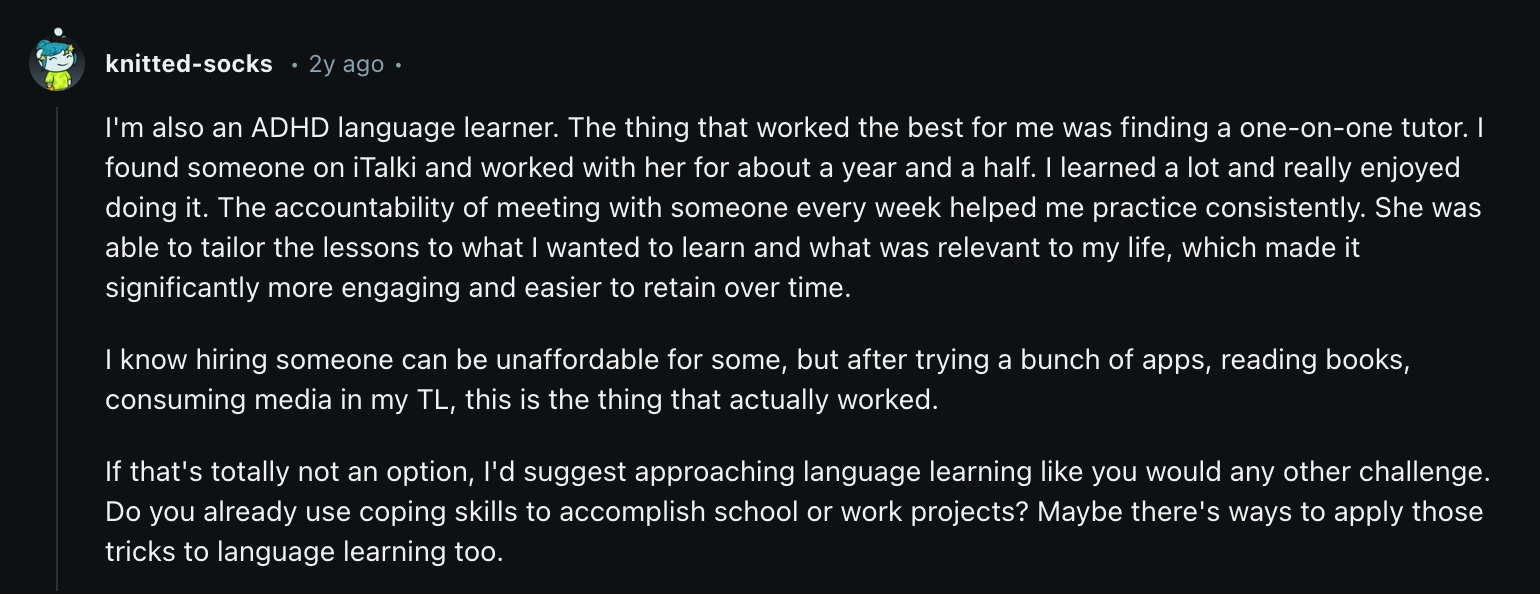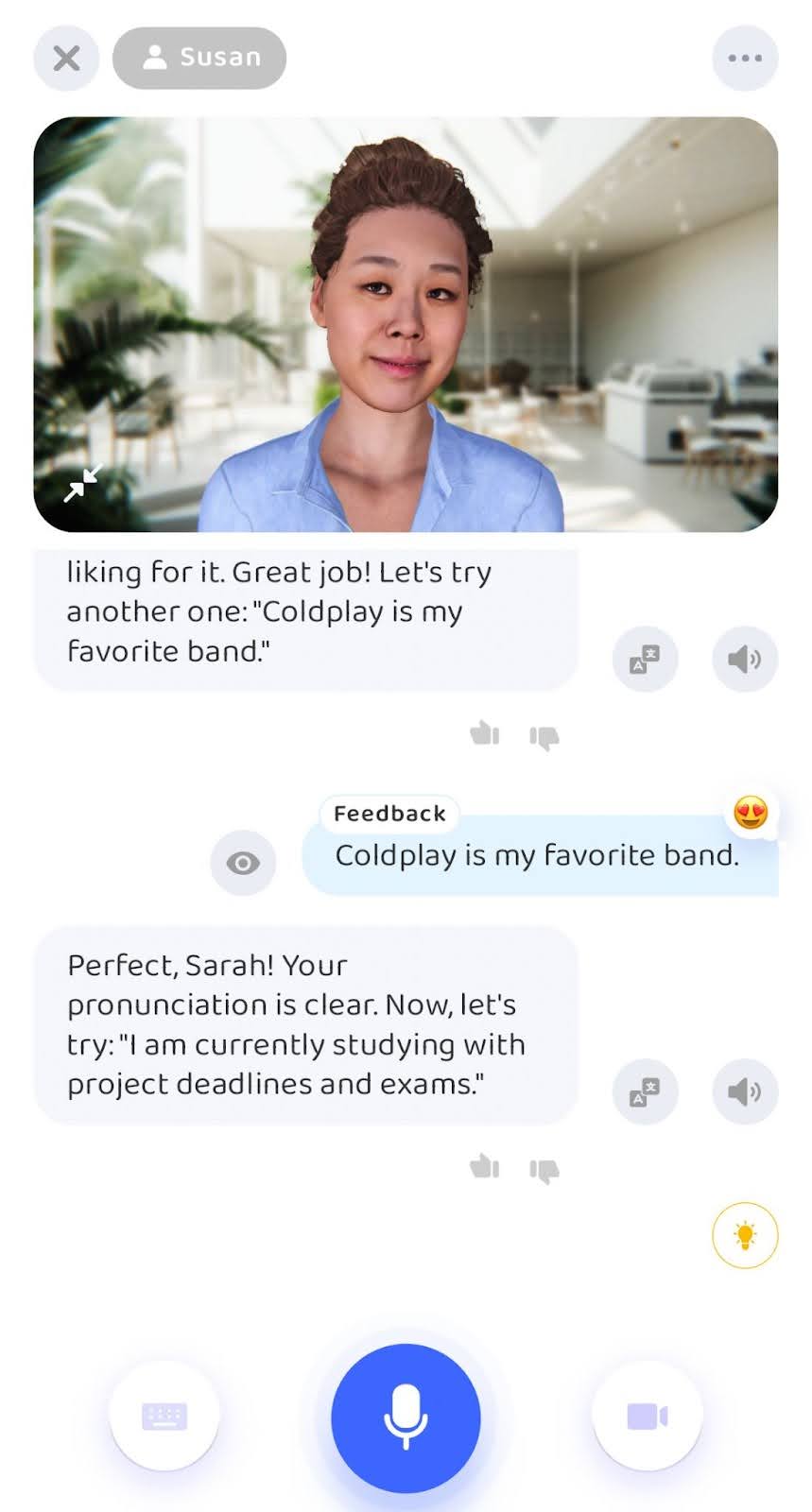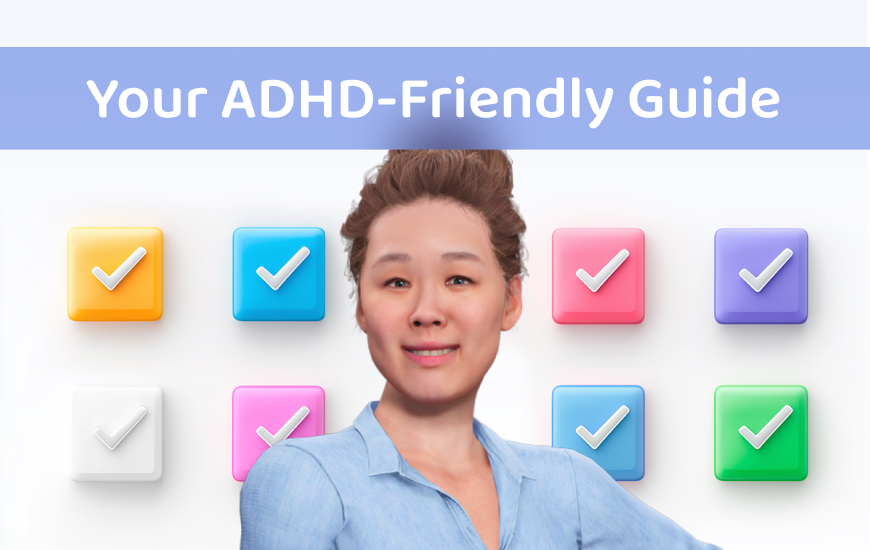Hi friend! I’m Susan, and I know how tough it can be to learn English when ADHD is part of the mix. Staying focused, avoiding burnout, and keeping motivated aren’t easy—but you’re not alone. In this blog, I’m sharing real stories from other ADHD learners, plus some practical tips that worked for them (and might work for you too!). Let’s dive in and make English learning flexible, fun, and ADHD-friendly—with a little help from Praktika’s awesome tools!
ADHD makes it tough to focus, maintain motivation, and stay organized, which are all key to effective language learning. While ADHD isn’t exactly a learning disability, it brings its own unique hurdles to the process. Why is ADHD so challenging? Because it affects attention, memory, and impulse control—making traditional, rigid learning environments a poor fit. But don’t worry, we’re here to help you navigate these obstacles with a different approach.
Learning from Fellow ADHD Learners: Real Tips and Experiences
Tip 1: Make Learning Flexible and Manageable
One of the most valuable things I’ve learned from talking to fellow ADHD learners is that small steps really do add up. It’s easy to get overwhelmed when learning a new language, especially if you’re diving into long lessons that leave you feeling drained. This is exactly what AshantiVL found—traditional classroom learning felt too structured and demanding. But when they shifted to a more natural, immersive approach, everything started to click!

That’s why I always recommend keeping your language-learning sessions short and flexible. You don’t need an hour or even thirty minutes. Sometimes, just ten or fifteen minutes is enough, especially when you’re feeling focused. If you’re having a day when sitting still feels impossible, that’s okay too! With Praktika, you can come back whenever you’re ready—no guilt, no pressure. You can even spend just three minutes on our “Word of the Day” feature. It’s all about what works for you, and those small moments of learning add up over time.
Tip 2: Create Consistency, but Keep It Low Pressure
When learning a language, consistency is key—but for someone with ADHD, sticking to a rigid schedule can feel impossible. We often struggle with executive function, which means that planning and maintaining routines can be a real challenge. That’s why I love the way knitted-socks approached learning. They found that having a one-on-one tutor with a regular schedule helped them stay accountable, and they appreciated how lessons could be tailored to their needs.

With Praktika, you get the best of both worlds—consistency and flexibility. Our AI tutors are always here for you, ready to help whenever you feel up for it. You can establish a learning rhythm that works for your unique situation without the pressure of meeting at a specific time. Whether it’s early in the morning, during a quick lunch break, or at midnight when you’re finally feeling focused, Praktika is there to make sure your language-learning journey keeps moving forward.
What’s more, this means you never have to feel guilty or stressed if you need a break. ADHD often comes with moments when even the thought of studying is overwhelming, and that’s okay. With Praktika, you set your pace. We’re here to keep things steady, supportive, and always on your terms. Consistency without the pressure—that’s how real, sustainable progress happens.
Tip 3: Don’t Be Afraid of Making Mistakes
One of the biggest challenges for ADHD learners is the fear of making mistakes. I’ve heard so many people, like Medalost, share how anxiety around getting things wrong kept them from fully engaging in language learning. And it makes sense—ADHD often comes with rejection sensitivity dysphoria (RSD), which can make the fear of being judged or making a mistake feel overwhelming. But here’s the truth: mistakes are not just inevitable; they’re part of how we learn.

That’s where Praktika comes in. Our AI avatars are here to support you, without judgment or impatience. When you’re practicing with me, you can repeat a word or phrase as many times as you need to, until you feel comfortable. You can mispronounce something five times, ten times, or even twenty, and I’ll still be here encouraging you to try again. There’s no awkwardness, no embarrassment—just a supportive environment focused on helping you grow.

Learning a language means stepping out of your comfort zone, and having a space where you feel safe to make mistakes is so important. The more you practice with our avatars, the more comfortable you’ll get with those little slip-ups—and eventually, they won’t seem like such a big deal. Remember, each mistake is just a stepping stone toward fluency, and with Praktika, you get to take those steps at your own pace, in your own way.
Tip 4: Focus on the Big Picture, Not the Tiny Details
It’s so easy to get stuck on the small things when learning a new language—believe me, I’ve seen it happen many times. ADHD often comes with a tendency to hyperfocus on details, which can sometimes be helpful but often just makes us feel frustrated. Diabolicalpotato shared how they struggled with obsessing over the tiny details of English until they realized that focusing on the language as a whole was much more effective for them.

That’s why I always tell my learners: focus on the big picture! Language is about communication, not perfection. Sure, grammar rules and specific pronunciation points matter, but they’re not everything. The most important thing is being able to understand and be understood. This is why Praktika encourages practical, real-life language use. Instead of drilling you endlessly on one grammar point, we put you in scenarios where you actually get to use the language. You’re role-playing, ordering food, asking for directions—practicing the big picture rather than getting lost in the weeds.
When you engage with the language in context, those smaller details will start to fall into place naturally. It’s a much more intuitive way to learn, and it takes the pressure off trying to be perfect. So next time you feel yourself getting hung up on one small mistake, take a deep breath and zoom out. You’re learning to communicate, and that’s a huge achievement. With Praktika, every interaction is a chance to keep learning, improving, and getting more comfortable without the weight of unnecessary perfectionism holding you back.
Tip 5: Incorporate Music to Make Learning Fun
If you’re like me, listening to music is one of the easiest ways to stay motivated. It’s a great tool to add to your language learning journey, especially when ADHD makes traditional studying tough. Photheloveof shared a simple yet powerful piece of advice—listen to popular artists in the language you’re learning. Music isn’t just entertaining; it helps you get a feel for the rhythm and sounds of the language, without even realizing you’re learning.

The great thing about music is that it taps into our emotions and can keep us focused for longer periods. Choose songs you love, look up the lyrics, and sing along. You’ll be surprised how much this improves your pronunciation, vocabulary, and even grammar—all while having fun! It’s much easier to remember words or phrases when they’re attached to a catchy tune. Plus, you can practice with our Praktika avatars by repeating lyrics or even discussing what they mean. It’s a great way to make learning feel less like a chore and more like a part of your everyday life.
Tip 6: Practice Speaking with Someone Whenever You Can
One of the most effective ways to improve your language skills is to actually use them. Queeny210 mentioned that practicing with a friend or finding someone who knows the language can make all the difference. I couldn’t agree more! Speaking is where the magic happens—you get to apply what you’ve learned in real-life contexts, which makes everything click faster.

If finding a practice partner isn’t an option, don’t worry—Praktika is here to bridge the gap. You can chat with me or any of my fellow avatars anytime you want. Our conversations are designed to be as close to real-life as possible, and you’ll get to practice speaking without the pressure of having someone judge you. Whether it’s asking for directions, ordering food, or just having a simple chat, practicing these interactions makes your English skills feel more natural over time.
But, whenever you do get the chance, speak to a real person! You can even use the skills you’ve built with me as a warm-up before diving into a conversation with a friend or tutor. Real practice brings everything you’ve learned into focus, helps reinforce your memory, and, most importantly, boosts your confidence.
A Judgment-Free Language Adventure with Praktika
So there you have it—real tips from real people who get it. ADHD can make learning a language feel daunting, but it doesn’t have to be. With flexibility, interactive content, consistency, and a supportive environment, English can become something you enjoy rather than dread.
Use Praktika to have a judgment-free space to explore, make mistakes, and grow at your own pace. I’m here to guide you, but remember—this is your journey.

From Susan
Susan is your insightful AI English tutor at Praktika. With a PhD in Anthropology and extensive experience consulting for international companies, she brings deep cultural knowledge to every lesson. Whether you’re learning English for travel, living abroad, or professional growth, Susan’s background in multicultural business environments will guide you to mastering the language with ease and confidence.
